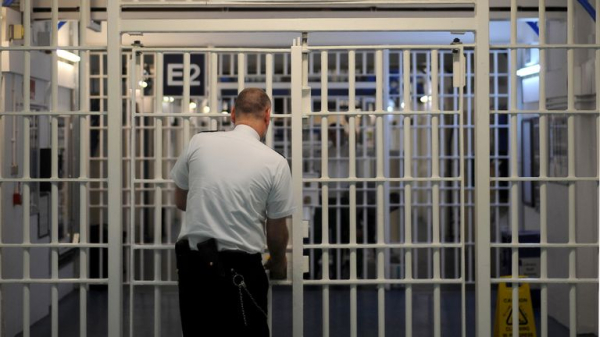
An emergency measure has been triggered by the Ministry of Justice to deal with prison overcrowding in England.
Operation Early Dawn will see defendants in police custody remain there – and not be transferred to magistrates’ courts for bail hearings – in case there is no space in jail cells for that prisoner if they are remanded into custody.
Sky News understands the measure is just being used in London and the North East, at the moment.
The Law Society, which represents solicitors in England and Wales, says many magistrates’ court cases will be delayed as a result, with the most serious cases given priority.
Defendants who are not prioritised will be released on police bail, the Law Society added.
At Prime Minister’s Questions, Sir Keir said the “prison system is in chaos” and asked the prime minister if his decision to “let prisoners out 70 days early makes our country more secure”.
A Ministry of Justice spokesman said: “This government is categorical that the most dangerous offenders should stay behind bars for longer, which is why new laws will keep rapists locked up for every day of their prison sentence and ensure life means life for the most horrific murderers.
“We continue to see pressure on our prisons following the impact of the pandemic and barristers’ strike which is why we have initiated a previously used measure to securely transfer prisoners between courts and custody and ensure there is always a custody cell available should they be remanded.”
Follow live politics updates
The Law Society said it was “crystal clear” the prison space crisis “is a consequence of the government’s approach to justice including over a decade of underfunding of our criminal justice system”.
A spokesman added: “Victims, witnesses, defendants and lawyers will today turn up at magistrates’ courts across England only to find out that their cases have been delayed due to a crisis in prison and police cell capacity outside of their control.
“As of now, we understand that this pattern will be repeated every day that this emergency measure is in place.”

High-risk offenders being released early
In February, a separate scheme – the End of Custody Supervised Licence (ECSL) – to allow prisoners to be released early due to a lack of space was extended indefinitely. Those convicted of serious offences are not eligible for early release.
A row broke out over the scheme during Prime Minister’s Questions on Wednesday after Labour leader Sir Keir Starmer accused Rishi Sunak of allowing sex offenders to be released early.
Sir Keir quoted a report published on Tuesday by HM Chief Inspector of Prisons about Lewes prison in East Sussex, after he found a “high-risk prisoner had his release date brought forward under the ECSL scheme, despite having a history of stalking, domestic abuse and being subject to a restraining order”.
“He was a risk to children and subject to an exclusion zone that included the local authority responsible for trying to house him,” the report said.
But the prime minister said: “As I’ve said, no one should be put on this scheme if they are a threat to the country.
“And let me be crystal clear… it does not apply to anyone serving a life sentence.
“Anyone convicted of a serious violent offence, anyone convicted of terrorism, anyone convicted of a sex offence, and crucially, in contrast to the system that Labour had put in place, governors and the prison service have an absolute lock so that no one is put on this scheme who shouldn’t be.”

